Status Integrity Check performs a 5-point analysis to help ensure progress
measurement does not interfere with Critical Path calculations. It then
displays the results in an Excel spreadsheet, without disturbing the schedule
file contents.
Step 1 -
Click Status Integrity Check
With the file to be analyzed open and active, click Status Integrity
Check on the SDSI Analysis Tools toolbar as shown (you may also select
it from the SDSI Analysis Tools menu under the Tools drop-down menu).
|
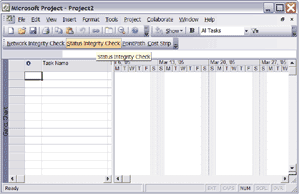 |
Step 2 -
Click “Yes”
Once activated, you will see the following dialog box. Click “Yes”
to analyze the file and generate the report. You may exit the utility
without the analysis being performed or the report being generated
by clicking “No”. |
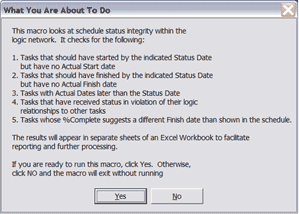 |
Step 3 -
Enter the Date
After clicking “Yes” on the prior dialog box, you will
be prompted to enter the As Of date for the analysis. Please enter
the date in the format indicated. Only after the date is entered,
click “OK”. |
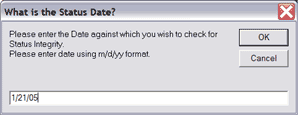 |
Step 4 -
Click “OK”
When processing is complete, the following dialog box will appear.
You may also notice that Microsoft Excel has been launched. Click
“OK”. |
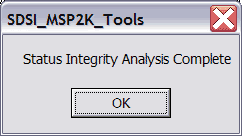 |
Step 5 -
Click “OK”
After acknowledging process completion, you will see the following
dialog box. When you click “OK” to this, Microsoft Excel
will close. Make sure you review your results and save the spreadsheet
if desired before clicking “OK” on this dialog box. |
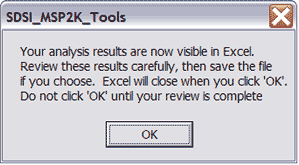 |
Step 6 -
Your Excel report
These represent some of the results that will appear in your Excel
report. There will be one sheet for each analysis performed. If the
sheet is blank except for the header, then that analysis revealed
nothing in the schedule file indicating improper schedule status.
You should pay particular attention to results on the “Statused
Out-of-Sequence” sheet as this indicates status was entered
in a manner not supported by schedule logic and may adversely affect
critical path calculations for the file.
Next: TaskTrace |
[+] view full-size screenshot 1
2
3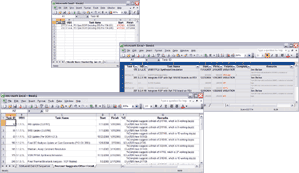 |

















